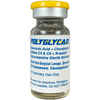Polyglycan
This is a prescription item
We’ll collect your veterinarian’s information at checkout to authorize the prescription.

Don’t have a veterinarian? Book an appointment with Vetster
 Temporarily Out of Stock
Temporarily Out of Stock
 Thank you, we will notify you when this product is available.
Thank you, we will notify you when this product is available.
What is Polyglycan?
Polyglycan is an injectable solution that helps maintain healthy joints and mobility in horses. It is indicated for the replacement of lost or damaged synovial fluid, which is the fluid found in the cavities of joints. Polyglycan also assists in the normalization of synovial fluid viscosity. Polyglycan requires a prescription from your veterinarian and requires refrigeration. Polyglycan must be kept at refrigerator temperatures at all times. To ensure proper temperature, Polyglycan requires overnight shipping at an additional cost.
For:
Horses
Benefits:
- Helps maintain healthy joints and mobility
- Replaces lost or damaged synovial fluid in the joints
- Injectable medication
- Single-use vials
How does Polyglycan work?
Polyglycan contains the ingredients hyaluronic acid, chondroitin sulfates C4 and C6, and N-acetyl-D-glucosamine, which help replenish lost synovial fluid with naturally occurring elements, assists in the normalization of synovial fluid viscosity, and post-surgical lavage of joint cavity and surfaces.
Cautions:
For use in horses only. Keep this medication and all other medications out of the reach of children and pets.
Brand Name:
Polyglycan
Generic Name:
Hyaluronic Acid, Chrondoitin sulfates C4 & C6, N-acetyl-D-glucosamine Sterile Solution
What is the most important thing I should know about Polyglycan?
Polyglycan requires a prescription from your veterinarian. Polyglycan also requires refrigeration at all times. To ensure proper temperature, Polyglycan requires overnight shipping at an additional cost. It is available in a single-use vial that contains 12.5 mg of hyaluronic acid sodium salt, 250 mg of sodium chondroitin sulfate, and 250 mg of N-acetyl-D-glucosamine.
What should I discuss with my veterinarian before giving Polyglycan to my horse?
Tell your veterinarian if your horse has a hypersensitivity to hyaluronic acid sodium salt, sodium chondroitin sulfate, or N-acetyl-D-glucosamine. Also tell your veterinarian if your horse is pregnant, breeding, or lactating. Your veterinarian should know if your horse is currently taking any other medications as well.
How should Polyglycan be administered to my horse?
Follow your veterinarian's instructions exactly as directed. Polyglucan should be instilled into the synovial space to replace lost synovial fluid. The dosage is determined by your veterinarian. After administration, discard any unused portion of vial contents.
What are the potential side effects of Polyglycan?
Side effects of Polyglycan can include diarrhea, vomiting, melena (dark, tarry stool), lethargy, and lack of appetite.
What happens if I miss giving a dose of Polyglycan?
If you miss a dose of Polyglycan, give the missed dose as soon as possible. If it is almost time for the next dose, skip the missed dose and resume a normal dosing schedule.
What happens if I overdose my horse on Polyglycan?
Contact your veterinarian immediately if you think you overdosed your horse.
What other drugs will affect Polyglycan?
Let your veterinarian know if your horse is currently taking any other medications, including prescription and over-the-counter medications and supplements.
Polyglycan Directions:
- Follow your veterinarian's instructions exactly as directed.
- Polyglucan should be instilled into the synovial space to replace lost synovial fluid.
- The dosage is determined by your veterinarian.
- After administration, discard any unused portion of vial contents.
Always make sure to provide your horse with fresh drinking water.
Polyglycan Dosage:
| Weight | Dosage |
|---|---|
| All weights | Your veterinarian will determine your horse's dosage |
| Cats | Do not use! |
|---|
| Dogs | Do not use! |
|---|
Storage:
Polyglycan must be kept in the refrigerator. Do not freeze.
Polyglycan Ingredients:
| Active Ingredients (per vial) | Amount |
|---|---|
| Hyaluronic acid sodium | 50 mg |
| Sodium chondroitin sulfate | 1000 mg |
| N-acetyl-D-glucosamine | 1000 mg |
 Swipe
Swipe
Customers also boughtView All
 Swipe
Swipe












































